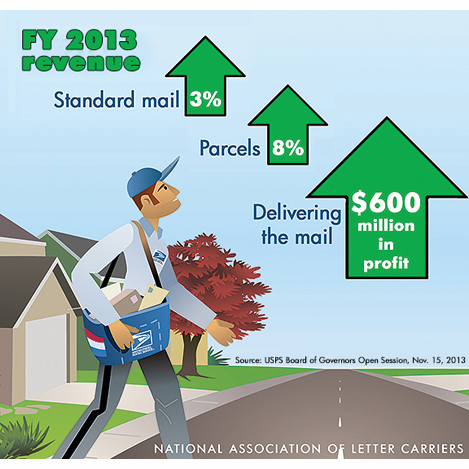NATIONAL
Pre-funding mandate masks USPS 2013 profit
WASHINGTON, D.C. (Nov. 20, 2013) — The U.S. Postal Service on Friday announced its year-end results for Fiscal Year 2013, citing a loss of $5 billion. Two major postal unions were the first to point out that the Postal Service actually made a profit on its operations.
 “Headlines across the country are shouting that the USPS lost billions of dollars again this year, but that’s a fallacy,” said American Postal Workers Union President Mark Dimondstein. “If it weren’t for the congressional mandate to pre-fund health benefits for future retirees, the USPS would have shown a surplus of $600 million.”
“Headlines across the country are shouting that the USPS lost billions of dollars again this year, but that’s a fallacy,” said American Postal Workers Union President Mark Dimondstein. “If it weren’t for the congressional mandate to pre-fund health benefits for future retirees, the USPS would have shown a surplus of $600 million.”
Fredric Rolando, president of the National Association of Letter Carriers added, “This mandate — a political requirement placed on no other agency or company in the country — cost $5.6 billion.”
Now it’s time for Congress to set aside bills that focus on cutting service and attacking the pay and benefits of postal workers instead of addressing the real cause of the crisis: the 2006 pre-funding mandate.
The Postal Service is positioned for a strong comeback if lawmakers act sensibly—by addressing the pre-funding fiasco that created an artificial financial crisis, and by freeing the Postal Service to use its universal retail and delivery networks to innovate and grow.
The Postal Service has used its financial crisis to justify service changes which have affected Washington residents. The closure of mail processing in Everett, Olympia and Pasco earlier this year have brought reports of delayed mail. The Postal Service plans to shutter mail processing in Tacoma and Wenatchee in February 2014, and officially switch to a slower delivery schedule for first-class mail. Rural post offices throughout the state are seeing drastic cuts in lobby hours, and urban patrons have seen postal stations moved from downtown to less convenient areas, as occurred in Redmond, and is planned for Bellevue and Wenatchee.
The official Postal Service release highlighted “revenue growth and record productivity,” but continued the call for service cuts for patrons and benefit cuts for employees.
“The USPS is suffering from a manufactured crisis,” Dimondstein said. “But the fallout of the artificial crisis is real.”
Service has declined dramatically — mail takes days longer to arrive, carriers are delivering mail in the dark, lines at post offices are out the door — and good, union postal jobs are disappearing. The solution is clear: Congress must repeal the pre-funding mandate and allow the Postal Service to develop new services that will provide new revenue.
Dimondstein added, “Unfortunately, there are some in Congress who want the Postal Service to fail. They are eager to privatize it.”
David Yao contributed to this report.





